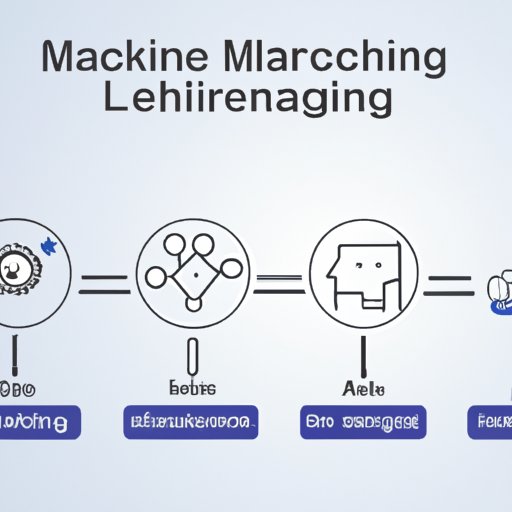Introduction
In recent years, advances in technology have seen a rapid increase in the development of both machine learning and artificial intelligence (AI). Despite their similarities, there is still confusion surrounding the two concepts. This article aims to explore the differences between the two technologies, as well as their relationship to one another and their impact on businesses.
Comparison of Machine Learning and Artificial Intelligence
Machine learning and AI are often used interchangeably, but they are not the same thing. Machine learning is a subset of AI that focuses on creating algorithms which can learn from data and improve over time without being explicitly programmed. AI, on the other hand, is a broader concept that involves machines being able to carry out tasks in a way that mimics human intelligence, such as problem-solving, decision-making and natural language processing.
While both machine learning and AI share some common features, such as the ability to process large amounts of data quickly, they also have several key differences. For instance, AI is focused on replicating human intelligence and behaviour, while machine learning is more concerned with using data to make predictions and decisions.
What is the Difference Between Machine Learning and AI?
To better understand the distinction between machine learning and AI, it is important to look at each technology in more detail.
Machine Learning
According to Science Daily, “machine learning is an application of artificial intelligence (AI) that provides systems the ability to automatically learn and improve from experience without being explicitly programmed”. In other words, it is a form of AI that enables computers to analyse data and identify patterns without requiring human intervention. This enables machines to make decisions based on the data they have gathered, allowing them to become “smarter” over time.
Artificial Intelligence
AI is a broad term that refers to any system that can perform tasks that normally require human intelligence. This includes tasks such as image recognition, natural language processing, and problem-solving. According to Forbes, AI is “the science and engineering of making intelligent machines that can perceive, reason, act, and adapt”. AI has the potential to revolutionise many industries by automating mundane tasks and providing insights into complex problems.
The Pros & Cons of Machine Learning & AI
As with any technology, there are both benefits and drawbacks to machine learning and AI. It is important to consider both sides before deciding whether or not to invest in either technology.
Benefits of Machine Learning
One of the main benefits of machine learning is its ability to automate tedious and repetitive tasks. By analysing data and identifying patterns, machines can make decisions faster and more accurately than humans. This can save businesses both time and money, as well as freeing up employees to focus on more creative tasks.
Another advantage of machine learning is its ability to detect anomalies in data. By analysing large datasets, machines can identify unusual patterns that may indicate fraudulent activity or other threats. This can help organisations protect their assets and reduce the risk of cyberattacks.
Drawbacks of Artificial Intelligence
Despite the many advantages of AI, there are also a few drawbacks. One of the main issues is the cost. Developing and deploying an AI system can be expensive, and this cost can be difficult for small businesses to bear. Additionally, AI systems can be difficult to maintain due to their complexity, which can lead to additional costs.
Another issue is the potential for bias. As AI systems are only as good as the data they are trained on, if the data is biased, then the results will be too. This can lead to inaccurate results that can have serious consequences for businesses.
Understanding the Relationship Between Machine Learning & AI
Although machine learning and AI are distinct technologies, they are interdependent and can be used together to create powerful solutions. By combining the strengths of both technologies, businesses can create powerful applications that can automate complex tasks and provide deeper insights into data.
For example, machine learning can be used to analyse customer data and identify trends. This data can then be used by AI to develop personalised recommendations and automated responses to customer queries. This combination of technologies can help businesses provide better customer service and gain a competitive edge.
How Machine Learning & AI Impact Businesses
The combination of machine learning and AI can have a major impact on businesses, both in terms of automation and efficiency. Automation is one of the most obvious benefits, as it can free up employees to focus on more valuable tasks, as well as reducing errors and improving accuracy. Additionally, AI can help organisations gain valuable insights into customer behaviour and preferences, which can help them develop more effective marketing strategies.
An Overview of Machine Learning & AI in the Modern World
The popularity of machine learning and AI has grown significantly in recent years, and it is now being used in many industries, from healthcare to finance. According to Gartner, “by 2020, AI will be nearly ubiquitous in almost every new software product and service”. This indicates that machine learning and AI will continue to grow in importance in the years ahead.
The future of machine learning and AI is bright, and the potential applications are endless. From self-driving cars to virtual assistants, the possibilities are only limited by our imagination.
Conclusion
Machine learning and AI are two distinct technologies that can be used together to great effect. While they share some similarities, they also have key differences that must be taken into account when considering which technology is best suited for a particular task. Ultimately, understanding the relationship between the two technologies is essential for businesses looking to leverage their potential.
(Note: Is this article not meeting your expectations? Do you have knowledge or insights to share? Unlock new opportunities and expand your reach by joining our authors team. Click Registration to join us and share your expertise with our readers.)
